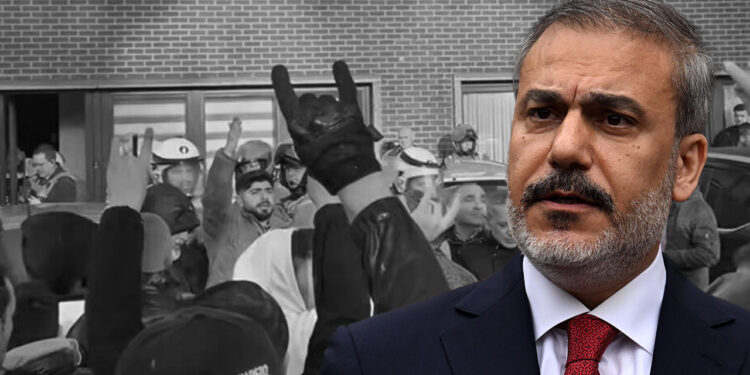The Turkish Foreign Ministry has issued a statement on Tuesday endorsing those implicated in violent assaults on the Kurdish community in Leuven, Belgium, labelling the Kurds as “PKK militants”.

After attacks on the Kurdish community in Belgium by Turkish extremist groups, the Turkish Foreign Ministry released a statement on Tuesday supportive of those behind the incidents.
Earlier, it has also been reported that the Turkish Foreign Minister Hakan Fidan had meetings with Turkish right-wing extremist groups prior to the attacks, prompting suspicion that the attacks were not spontaneous by organised with a potential political agenda.
The Turkish Foreign Ministry’s statement, labelling Kurdish individuals as militants of Kurdistan Workers’ Party (PKK)) and depicting them as aggressors in Leuven, Belgium, has met with criticism for misrepresenting the events that unfolded on 24 March 2024. Eyewitnesses and victims report a starkly different scenario, involving violent attacks on Kurdish families by individuals linked to Turkish nationalist movements, particularly after the celebrations for Newroz, Kurdish new year.
According to witness accounts, these assaults were not random acts of violence but targeted attacks by members of the Grey Wolves, known for their far-right and extremist ideology. The incidents included beatings, stabbings and attempts to set fire to homes where Kurdish families sought refuge, with victims chanting ‘takbir’ and performing the ‘wolf salute’, symbols associated with the attackers’ affiliations. The situation escalated to the point where police had to intervene, offering 24-hour protection to the affected Kurdish homes.
In the wake of these attacks, the Kurdish community, along with their allies, rallied outside the European Parliament in Brussels. They called for action against the perpetrators and highlighted the ongoing struggle against the Turkish government’s anti-Kurdish policies.
Yasin Gül, the deputy mayor of Heusden Zolder, notably appeared on CNN Turk, where he seemingly endorsed the attacks and blamed the Kurdish community, further inflaming tensions.
The backdrop to this incident includes efforts to criminalise the Kurdish movement in Belgium, a situation brought to light through leaked communications exposed by WikiLeaks. Belgian lawyer Jan Fermon pointed out that these efforts by Turkey and the US to label the Kurdistan Workers’ Party (PKK) as a terrorist organisation were revealed through the leaked cables. In January 2020, the Belgian Court of Cassation upheld a decision that the PKK could not be classified as a ‘terrorist organisation’, highlighting the political pressures at play.








Leave A Comment